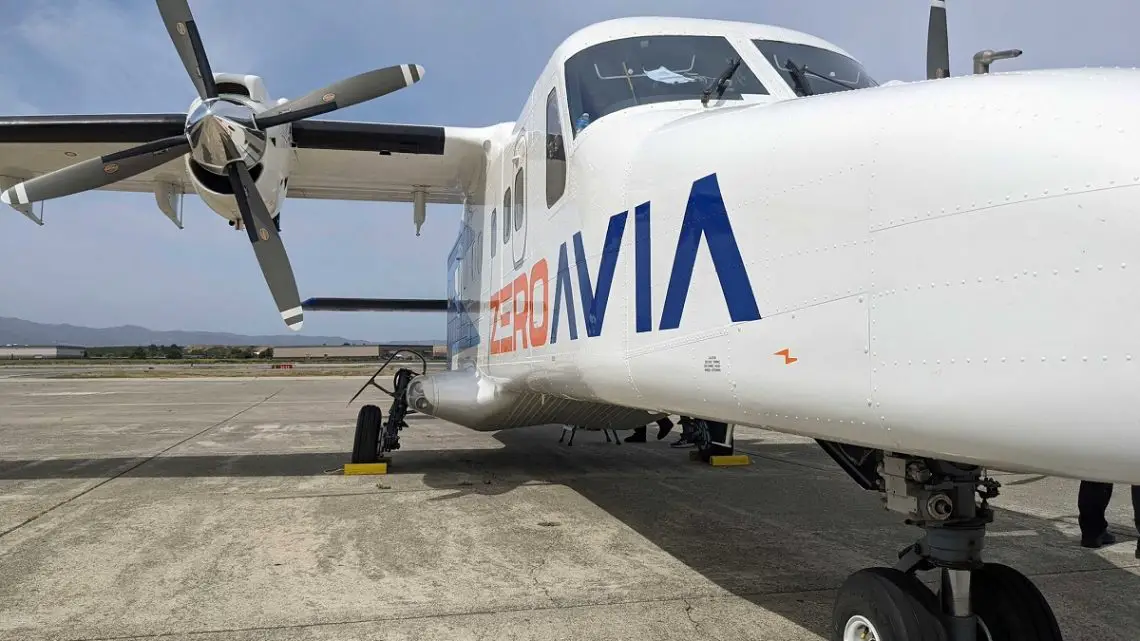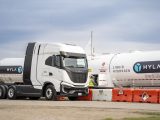
ZeroAvia takes next step in path to hydrogen plane flight with flyv
February 8, 2024The H2 aircraft company is pushing toward low-cost, on-demand, zero-carbon flights in Europe.
ZeroAvia has jointly announced with flyv that they have inked an agreement in which they will collaborate on using H2 to power zero-carbon emission flights with hydrogen planes in the European market.
The ZeroAvia H2 engines will power the aircraft for flyv’s low-cost, on-demand flight operations.
ZeroAvia has been making regular headlines, including here at Hydrogen Fuel News, with its ongoing progress in developing, building, and testing hydrogen plane technology.
It is currently moving forward with its certification efforts for a 600kW (ZA600) H2 fuel cell powered electric engine that can power aircraft from nine to nineteen seats exclusively using the zero-carbon emission fuel. According to the company, its ZA600 will begin commercial flight service in about two years.
Flyv’s goal is to overcome the challenges associated with conventional travel systems, within the limitations of growing demand throughout a range of market segments. It is also aiming to benefit from the current situation in which many smaller airfields are not being used to their full capacities. They believe that this opens the door to boosting services while lowering costs as cleaner technologies begin rolling out.
ZeroAvia and Flyv intend to use the latest cutting-edge technologies and hydrogen plane designs.
Flyv’s intentions are to combine the zero-carbon emission technology of ZeroAvia’s H2 fuel cell electric aircraft engines with the power of artificial intelligence (AI). In this way, it will be able to sell clean flights that match availability and demand to make it possible for passengers to enjoy the greatest booking flexibility. The company will be operating small aircraft that carry around ten passengers and is looking into ways to ensure that those flights will be made without producing greenhouse gas emissions.

Regional networks in Europe
Beyond booking flexibility and utilizing resources in the best ways to suit demand through the use of AI, the companies are also working to establish and broaden clean air mobility networks throughout the European Union. They will dive into the potential business and customer benefits of choosing hydrogen plane flights to decarbonize air travel.
“Flying can be the cleanest, quickest and cheapest way to travel in the near future given the rapid progress of zero-emission propulsion technology,” said ZeroAvia Chief Customer Officer James Peck. “It’s exciting to work with an innovative start-up airline like flyv that is rethinking the status quo to extend the benefits of flying.”
“As a low-cost, on-demand airline, we are proactively analyzing how to enhance efficiency and operational stability in a rapidly evolving world,” added flyvbird Co-Founder Anton Lutz. “With policies across the EU steadily making operating fossil fuel flight more costly and difficult, it is crucial for us to align with partners like ZeroAvia today, to prepare for a truly sustainable future. With ZeroAvia’s recent successes in engine development and testing, the feasibility of this innovative approach is clearer than ever.”
ZeroAvia continues to test its hydrogen plane engine technology to be ready for European flights.
 ZeroAvia’s testing has been focused on its prototype hydrogen plane engine, the ZA600. The tests have involved the installation of the prototype into a Dornier 228 aircraft out of its Kemble, Gloucestershire base in the United Kingdom. Flight testing began in 2023 and has been greatly successful, bringing the company to the point that it is now focused on receiving the necessary certifications it requires to proceed toward commercial flights in the next couple of years.
ZeroAvia’s testing has been focused on its prototype hydrogen plane engine, the ZA600. The tests have involved the installation of the prototype into a Dornier 228 aircraft out of its Kemble, Gloucestershire base in the United Kingdom. Flight testing began in 2023 and has been greatly successful, bringing the company to the point that it is now focused on receiving the necessary certifications it requires to proceed toward commercial flights in the next couple of years.
The technology used for the hydrogen plane engines is fuel cells powered by H2. These generate electricity that runs an electric motor in the plane, powering the propellers and other systems in the aircraft. The only emission produced throughout this process is water vapor.
Ready to test your knowledge on the most abundant element in the universe? Take our fun and engaging Hydrogen Quiz now! [forminator_quiz id=”58712″]



 HFN News is your leading source for fresh hydrogen and renewable energy updates. Amid the fast-paced growth of hydrogen companies, we provide top-notch news and insights about this exciting sector. Our coverage spans from hydrogen cars to global sustainable initiatives, and we highlight the latest in green jobs and developing hydrogen hubs. We invite you to share your local hydrogen news and explore today’s renewable energy job listings on our site. Thanks for choosing HFN News as your trusted guide to the hydrogen and renewable energy world!
HFN News is your leading source for fresh hydrogen and renewable energy updates. Amid the fast-paced growth of hydrogen companies, we provide top-notch news and insights about this exciting sector. Our coverage spans from hydrogen cars to global sustainable initiatives, and we highlight the latest in green jobs and developing hydrogen hubs. We invite you to share your local hydrogen news and explore today’s renewable energy job listings on our site. Thanks for choosing HFN News as your trusted guide to the hydrogen and renewable energy world!
